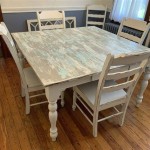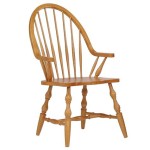Exploring the Essential Aspects of Antique Farmhouse Tables
Antique farmhouse tables, steeped in history and charm, are more than just pieces of furniture; they are conduits to the past that grace our homes with warmth and character. Understanding the essential aspects of these timeworn treasures is key to appreciating their enduring appeal and making informed choices when acquiring or maintaining them.
This article delves into the fundamental characteristics that define antique farmhouse tables, exploring their construction, materials, styles, and the unique patina they develop over time. By examining these aspects, we gain insights into the craftsmanship, beauty, and significance of these timeless pieces.
Construction and Materials
Antique farmhouse tables were typically handcrafted by skilled artisans using sturdy materials like oak, pine, or maple. Their construction reflects the practicality and aesthetic sensibilities of the time. These tables often feature thick legs, solid wood planks for the tabletop, and simple joinery techniques that have stood the test of time.
Styles and Variations
Antique farmhouse tables come in a variety of styles and variations, influenced by regional traditions and personal preferences. Some common styles include trestle tables with A-shaped legs, gateleg tables with hinged sides for versatility, and refectory tables with elongated rectangular tops.
Timeworn Patina and Distressing
One of the most distinctive characteristics of antique farmhouse tables is their timeworn patina and distressing. These tables have endured decades or even centuries of use, resulting in a unique finish that can range from scratches and dents to stains and discoloration. This patina adds character and depth, giving each table a story of its own.
Function and Versatility
Antique farmhouse tables were not merely decorative objects; they served essential functions in the home. They were used for dining, food preparation, and even work. Their large size and sturdy construction made them perfect for gathering family and friends around for meals and other social occasions.
Collectibility and Investment
In recent years, antique farmhouse tables have become highly collectible and investment-worthy. Their rarity, historical significance, and timeless appeal make them desirable pieces for collectors and interior designers alike. The value of these tables can vary greatly depending on factors such as age, condition, and provenance.
Conclusion
Understanding the essential aspects of antique farmhouse tables allows us to fully appreciate their beauty, craftsmanship, and historical significance. These tables are not simply functional pieces of furniture but rather tangible links to our past that add warmth, character, and value to our homes.

Turned Leg Modern Farm Table Antique Farmhouse

Rolling Farm Table Antique Farmhouse

152 Antique Farmhouse Tables For Ingantiques Co

Victorian Antique Ebonised Farmhouse Kitchen Table Vintage Boathouse

Rustic Farm Table Kitchen Tables Farmhouse Coffee Decor

Our Antique Farmhouse Table The Lettered Cottage

Antique French Farmhouse Table With Draw Leaves

Antique French Country Farmhouse Kitchen Table Vintage Boathouse

Reclaimed Wood Farmhouse Dining Table Antique

Breakfast Area Refresh And My New Farmhouse Table








